
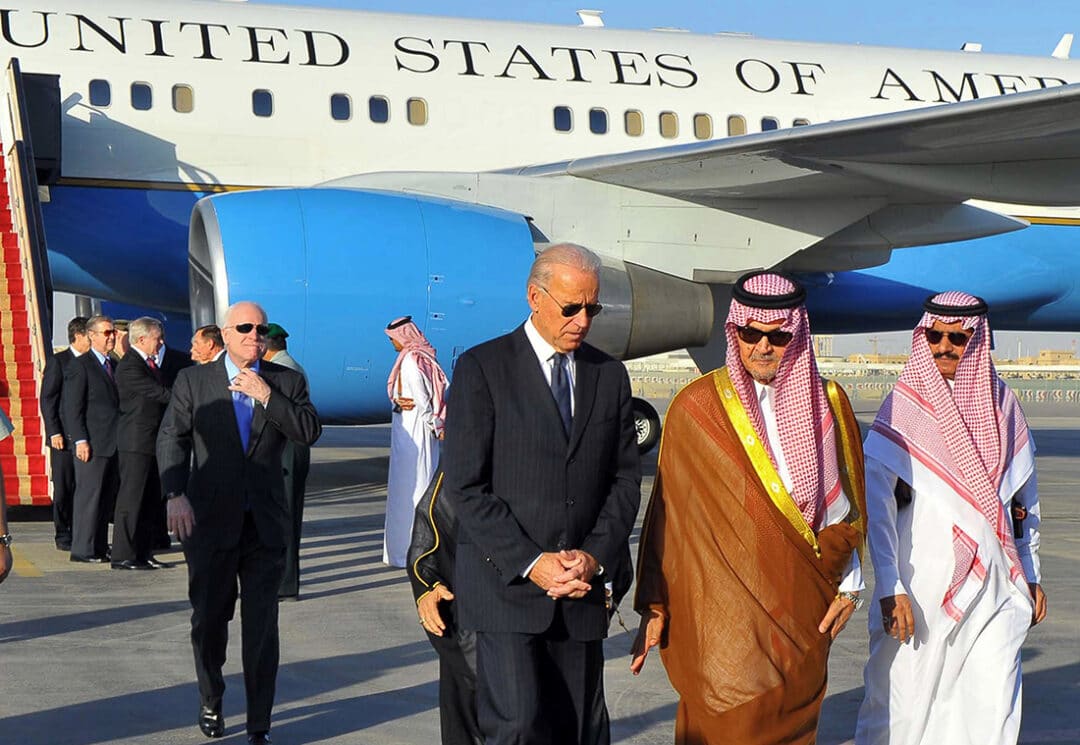
Saudi Foreign Minister Prince Saud al-Faisal (2nd R) welcomes US Vice President Joe Biden (C) at the Riyadh airbase on October 27, 2011, upon his arrival in the Saudi capital with a US official delegation to offer condolences to the King Abdullah bin Abdul Aziz following the death of his brother, Crown Prince Sultan. AFP PHOTO/STR (Photo credit should read -/AFP via Getty Images)
Joe Biden’s Submissive — and Highly Revealing — Embrace of Saudi Despots
by Glenn Greeenwald | Jun 12,2022
In 2018, President Trump issued a statement reaffirming the U.S.’s long-standing relationship with the Saudi royal family on the ground that this partnership serves America’s “national interests.” Trump specifically cited the fact that “Saudi Arabia is the largest oil producing nation in the world” and has purchased hundreds of billions of dollars worth of weapons from U.S. arms manufacturers. Trump’s statement was issued in the wake of widespread demands in Washington that Trump reduce or even sever ties with the Saudi regime due to the likely role played by its Crown Prince, Mohammed bin Salman, in the brutal murder of Washington Post columnist Jamal Khashoggi.
What made these Trump-era demands somewhat odd was that the Khashoggi murder was not exactly the first time the Saudi regime violated human rights and committed atrocities of virtually every type. For decades, the arbitrary imprisonment and murder of Saudi dissidents, journalists, and activists have been commonplace, to say nothing of the U.S./UK-supported devastation of Yemen which began during the Obama years. All of that took place as American presidents in the post-World War II order made the deep and close partnership between Washington and the tyrants of Riyadh a staple of U.S. policy in the Middle East.
Yet, as was typical for the Trump years, political and media commentators treated Trump’s decision to maintain relations with the Saudis as if it were some unprecedented aberration of evil which he alone pioneered — some radical departure of long-standing, bipartisan American values — rather than what it was: namely, the continuation of standard bipartisan U.S. policy for decades. In an indignant editorial following Trump’s statement, The New York Times exclaimed that Trump was making the world “more [dangerous] by emboldening despots in Saudi Arabia and elsewhere,” specifically blaming “Mr. Trump’s view that all relationships are transactional, and that moral or human rights considerations must be sacrificed to a primitive understanding of American national interests.”
The life-long Eurocrat, former Swedish Prime Minister Carl Bildt, lamented what he described as Trump’s worldview: “if you buy US weapons and if you are against Iran – then you can kill and repress as much as you want.” CNN published an analysis by the network’s White House reporter Stephen Collinson— under the headline: “Trump’s Saudi support highlights brutality of ‘America First’ doctrine” — which thundered: “Refusing to break with Saudi strongman Mohammed bin Salman over the killing in the Saudi consulate in Istanbul, Trump effectively told global despots that if they side with him, Washington will turn a blind eye to actions that infringe traditional US values.” Trump’s willingness to do business with the Saudis, argued Collinson, “represented another blow to the international rule of law and global accountability, concepts Trump has shown little desire to enforce in nearly two years in office.”
Perhaps the most vocal critic of Trump’s ongoing willingness to maintain ties with the Saudi regime were then-Democratic presidential candidates Joe Biden and Kamala Harris. As a recent CNN compilation of those statements demonstrates: “In the years prior to taking office, President Joe Biden, Vice President Kamala Harris, and many of their administration’s top officials harshly criticized President Donald Trump’s lack of action against Saudi Arabia and Crown Prince Mohammed bin Salman for the 2018 murder of Saudi journalist and Washington Post columnist Jamal Khashoggi.”
In a 2019 Democratic primary debate, Biden vowed: “We were going to in fact make them pay the price, and make them in fact the pariah that they are,” adding that there is “very little social redeeming value in the present government in Saudi Arabia.” Harris similarly scolded Trump for his ongoing relationship with the Saudis, complaining on Twitter in October, 2019, that “Trump has yet to hold Saudi officials accountable,” adding: “Unacceptable—America must make it clear that violence toward critics and the press won’t be tolerated.”
That Joe Biden was masquerading as some sort of human rights crusader who would sever ties with the despotic regimes that have long been among America’s most cherished partners was inherently preposterous. As Obama’s Vice President, Biden was central to that administration’s foreign policy which was driven by an embrace of the world’s most barbaric tyrants. So devoted was Obama to the U.S.’s long-standing partnership with Riyadh that, in 2015, he deeply offended India — the world’s largest democracy — by abruptly cutting short his visit to that country in order to fly to Saudi Arabia, along with leaders of both U.S. political parties, to pay homage to Saudi King Salman upon his death. Adding insult to injury, Obama, as The Guardian put it, boarded his plane to Riyadh “just hours after lecturing India on religious tolerance and women’s rights.”
The unstinting support of the Saudi regime by the Obama/Biden White House was not limited to obsequious gestures such as these. Their devotion to strengthening the despotic Saudi ruling family was far more substantial — and deadly. Obama’s administration played a vital role in empowering the Saudi attack on Yemen, which created the world’s worst humanitarian crisis: far worse than what has been taking place in Ukraine since the Russian invasion on February 24. In order to assuage the Saudis over his Iran deal, “Obama’s administration has offered Saudi Arabia more than $115 billion in weapons, other military equipment and training, the most of any U.S. administration in the 71-year U.S.-Saudi alliance,” reported Reuters in late 2016, just months before Obama and Biden left office.
Beyond the enormous cache of sophisticated weapons Obama/Biden transferred to the Saudis to use against Yemen and anyone else they decided to target, the Snowden archive revealed that Obama ordered significant increases in the amount and type of intelligence technologies and raw intelligence provided by the NSA to the Saudi regime. That intelligence was — and is — used by Saudi autocrats not only to identify Yemeni bombing targets but also to subject its own domestic population to rigid, virtually ubiquitous, surveillance: a regime of monitoring used to brutally suppress any dissent or opposition to the Saudi regime.
In sum, no hyperbole is required to observe that the Obama/Biden White House — along with their junior British counterparts — was singularly responsible for the ability of the Saudi regime to survive and to wage this devastating war in Yemen. But that is nothing new. The centerpiece of U.S. policy in the Middle East for decades has been to prop up Saudi despots with weapons and diplomatic protection in exchange for the Saudis serving U.S. interests with their oil supply and ensuring the use of the American dollar as the reserve currency on the oil market.
That is what made the hysterical reaction to Trump’s reaffirmation of that relationship so nonsensical and deliberately deceitful. Trump was not wildly deviating from U.S. policy by embracing Saudi tyrants but simply continuing long-standing U.S. policy of embracing all sorts of savage despots all over the world whenever doing so advanced U.S. interests. Indeed, what angered the permanent ruling class in Washington was not Trump’s policy of embracing the ruling Saudi monarchs, but rather his honesty and candor about why he was doing so. American presidents are not supposed to admit explicitly that they are overlooking the human rights abuses of their allies due to the benefits that relationship provides, even though that amoral, self-interested approach is and for decades has been exactly the foundational ideological premise of the bipartisan U.S. foreign policy class.
But this has been the core propagandistic framework employed by the DC ruling class since Trump was inaugurated. They routinely depicted him as an unprecedentedly monstrous figure who has vandalized American values in ways that would have been unthinkable for prior American presidents when, in fact, he was doing nothing more than affirming decades-old policy, albeit with greater candor, without the obfuscating mask used by American presidents to deceive the public about how Washington functions.
Beyond the Saudi example, this same manipulative media scam could be seen most vividly when Trump welcomed the brutal Egyptian dictator Abdel Fattah el-Sisi to the White House. As I reported at the time, the mainstream Washington commentariat depicted Trump’s meeting with and praise for the Egyptian strongman as some sort of shocking violation of bedrock American principles.
In fact, the U.S. has been by far the largest benefactor of Egyptian tyranny for decades. It armed and supported the Mubarak regime up until the very moment it was overthrown. Obama’s Secretary of State, John Kerry, praised the military coup engineered by Gen. Sisi against the country’s first democratically elected leader, as an attempt to protect democracy. And shortly before the Arab Spring began, Kerry’s predecessor, Hillary Clinton, declared her personal affection for Sisi’s predecessor, the monstrous dictator who ruled Egypt for three decades: “I really consider President and Mrs. Mubarak to be friends of my family, so I hope to see him often here in Egypt and in the United States,” Clinton gushed in 2009, while Obama ensured that the flow of money and weapons to Mubarak never ceased.
While the bipartisan political and media class has spent decades insisting, and still insists, that the core foreign policy goal of the U.S. is to defend freedom and democracy and fight tyranny around the world, the indisputable reality is the exact opposite: propping up the world’s most brutal dictators who serve U.S. interests has been a staple of U.S. foreign policy since at least the end of World War II.
The only attribute that differentiated Trump from his predecessors and the rest of the mainstream D.C. ruling class was not his willingness to do business and partner with despots. There are few policies official Washington loves more than that. It was his honesty about admitting that he was doing this and his clarity about the reasons for it: namely, that the real goal of U.S. foreign policy is to generate benefits for the U.S. (or, more accurately, ruling American elites), not to crusade for democracy and human rights. To the extent that one attempted to isolate any other difference between Trump and official Washington, it was that he was often insistent that “American interests” be defined not by “what benefits a small sliver of U.S. arms manufacturers and the U.S. Security State” but rather “what benefits the American people generally” (hence his eagerness, and his ultimate success, to be the first U.S. president in decades to avoid involving the U.S. in new wars).
In sum, the U.S. always has been, and continues to be, not just willing but eager to support and embrace foreign dictators whenever doing so serves those interests. They are just as willing and eager to overthrow or otherwise undermine and destabilize democratically elected leaders who are judged to be insufficiently deferential to American decrees. What determines U.S. support or opposition toward a foreign country is not whether they are democratic or despotic, but whether they are deferential.
Thus, it was not Trump’s embrace of long-standing U.S. partnerships with Saudi and Egyptian despots that represented a radical departure from the American tradition. The radical departure was Biden’s pledge during the 2020 presidential campaign to turn the Saudis into “pariahs” and to isolate them as punishment for their atrocities. But few people in Washington were alarmed by Biden’s campaign vow because nobody believed that Joe Biden — with his very long history of supporting the world’s worst despots — ever intended to follow through on his cynical campaign pledge. It took no prescience or cleverness to see it as nothing more than a manipulative attempt to demonize Trump for what official Washington, and Obama and Biden themselves, have always done with great gusto and glee.
This is why it comes as absolutely no surprise, repellent as it may be, that Joe Biden aggressively abandoned this core 2020 campaign foreign policy vow regarding Saudi Arabia the first chance he got. Far from turning them into a “pariah” state as he pledged, Biden has seamlessly continued — and even escalated — the U.S. tradition of propping up and strengthening what is quite plausibly the world’s single most despotic and murderous regime.
Just one month after Biden’s inauguration, the Director of National Intelligence made public a long-secret report that announced: “We assess that Saudi Arabia’s Crown Prince Muhammad bin Salman approved an operation in Istanbul, Turkey to capture or kill” Jamal Khashoggi. Yet the White House, while imposing some mild sanctions on some Saudi individuals, adamantly refused to impose punishments on Crown Prince bin Salman himself, dispatching anonymous officials to friendly media outlets to explain that they were unwilling to jeopardize the significant benefits that come from the U.S./Saudi partnership. That was exactly the argument Trump made in 2018 in defense of his identical decision which caused so much faux indignation. One would, needless to say, be very hard-pressed to find similarly vehement condemnations of Biden for vandalizing sacred U.S. principles by refusing to sever or even meaningfully reduce the American partnership with the Saudis due to their murder of Khashoggi.
But this was merely the start of Biden’s embrace of the Saudi regime. Last November, “the U.S. State Department approved its first major arms sale to the Kingdom of Saudi Arabia under U.S. President Joe Biden with the sale of 280 air-to-air missiles valued at up to $650 million.” Just a few weeks later, the U.S. Senate, reported Politico, “gave a bipartisan vote of confidence to the Biden administration’s proposed weapons sale to Saudi Arabia, blunting criticisms from progressives and some Republicans over the kingdom’s involvement in Yemen’s civil war and its human rights record.” A group of dissenters — led by Sens. Rand Paul (R-KY), Bernie Sanders (I-VT), and Mike Lee (R-UT) — argued that the arms sales would fuel the war in Yemen and embolden the Saudi regime, but they were easily swept aside by a status-quo-protecting bipartisan majority led by the two party’s leaders, Sen. Chuck Schumer (D-NY) and Mitch McConnell (R-KY).
And it was during that same time — long before the Russian invasion of Ukraine — when Biden had all but abandoned any pretense of weakening ties with the Saudis, let alone turning them into the “pariah” state he promised during the campaign against Trump. “Mr. Biden was already prepared to end the isolation of Prince Mohammed as far back as October when he expected to encounter the Saudi leader at a meeting of the Group of 20 leaders and most likely would have shaken hands,” explained The New York Times last week (bin Salman was a no-show at the meeting).
And now, it appears that Biden is planning a pilgrimage to Riyadh to visit his Saudi partners in person. Last week, The New York Times reported that Biden “has decided to travel to Riyadh this month to rebuild relations with the oil-rich kingdom at a time when he is seeking to lower gas prices at home and isolate Russia abroad.” During the trip, “the president will meet with” bin Salman himself, who Biden’s own DNI said oversaw the murder of Khashoggi. The rationale offered by The New York Times for Biden’s planned trip was virtually identical to the arguments Trump used in 2018: “the visit represents the triumph of realpolitik over moral outrage, according to foreign policy experts.”
Indeed, the explanation offered by Biden’s Secretary of State for the president’s ongoing embrace of the Saudis is virtually indistinguishable from the rationale offered by Trump that sparked so many outraged denunciations about the fall of American ideals supposedly caused by his willingness to do business with undemocratic regimes:
“Saudi Arabia is a critical partner to us in dealing with extremism in the region, in dealing with the challenges posed by Iran, and also I hope in continuing the process of building relationships between Israel and its neighbors both near and further away through the continuation, the expansion of the Abraham Accords,” Secretary of State Antony J. Blinken said on Wednesday at an event marking the 100th anniversary of Foreign Affairs magazine. He said human rights are still important but “we are addressing the totality of our interests in that relationship.”
Despite Biden’s clear abandonment from the start of his campaign pledge to distance the U.S from the Saudis, this trip is being justified by the need to plead with the Saudis to make more oil available on the market in order to compensate for U.S.-led sanctions on Russia. As The Times put it: “Russia and Saudi Arabia are close to tied as the world’s second-largest oil producers, meaning that as Biden administration officials sought to cut off one, they concluded they could not afford to be at odds with the other.” After the Times report, Biden officials said the trip had been postponed to July, but did not deny that it was happening.
What cogent moral argument can be advanced that it is preferable to buy Saudi oil as a means of avoiding the purchase of Russian oil? Whatever one’s views are on the extent of autocracy under Putin’s rule in Russia, there is no minimally credible argument that it is worse than the systemic tyranny long imposed by the Saudi ruling family. Indeed, it is virtually impossible to contest that, at least prior to the Russian invasion of Ukraine, civil freedoms were more abundant in Russia than in Saudi Arabia. And while one can certainly contend that Russia’s three-month war in Ukraine has been more a moral atrocity, there is no basis — none — for arguing that it is worse on any level than the indiscriminate violence and destruction the Saudis have been unleashing for seven years in Yemen (unless one values the lives of European Ukrainians more than non-European Yemenis).
And even if one did insist upon the view that absolutely nothing on the planet is worse than the Russian invasion of Ukraine and that everything must therefore be done to maintain the sanctions regime imposed on Russia, how would that dubious moral claim justify overlooking Saudi atrocities and sending Biden, on his knees, to beg bin Salman for more oil? If suffocating and punishing Russia is the highest moral and strategic priority, why would it not be more prudent and more moral for the U.S. to lift Biden’s restrictions on its own domestic drilling as a means of replacing Russian oil, especially if that would avoid the need to further strengthen the Saudi regime?
But herein lies the unique truth-providing value of the U.S. partnership with Saudi Arabia. Of course U.S. foreign policy is not devoted to spreading freedom and democracy and fighting despotism and tyranny in the world. How can a country that counts the Saudi monarchs, the Egyptian military junta, the Qatari slave owners, and the Emirati dictators as its closest partners and allies possibly claim with a straight face that it opposes tyranny and fights wars in order to protect democracy? The U.S. does not care, at all, whether a foreign country is ruled by democracy or tyranny. It cares about one question and one question only: whether the government of that country serves or hinders U.S. interests. Donald Trump’s sin was admitting this obvious fact.
This has been the central deceit shaping the virtually closed propaganda system imposed by the West around the U.S./NATO role in the war in Ukraine. If Western leaders had simply acknowledged from the start the obvious truth about their role — that they regard Russia as a geopolitical adversary and seek to exploit the war in Ukraine to weaken or even break that country — at least an honest debate would have been possible. Instead, they and their corporate media allies did what they always do whenever a new war is newly marketed: they draped it in fabricated moral fairy tales about freedom-fighting and opposition to tyranny.
Thus, the popular Western moralistic narrative imposed a series of claims about U.S. motives that should not have even passed the laugh test, yet became virtually obligatory articles of faith. The U.S. is not involved in this war in Ukraine because it sees an opportunity to advance its own interests by sacrificing Ukraine in order to weaken Russia (a truth they began admitting in private: their goal is not to end the war but prolong it). Nor is the U.S. motivated by an opportunity to enrich the weapons manufacture industry which lost its primary weapons market after the U.S. withdrawals from Iraq and Afghanistan and which wields enormous power in Washington. Nor does the U.S. government, with its posture of Endless War, seek to justify the ever-increasing budget and power of the U.S. Security State and the sprawling Pentagon bureaucracy. Perish these thoughts.
The massive benefits conferred on those powerful sectors by every new war are always just happy coincidences. Only a deranged conspiracy theorist would believe that profit and power for these factions — whose unrestrained growth was the target of Dwight Eisenhower’s grave warnings when leaving office in 1961: long before their power exploded even more due to Vietnam, the ongoing Cold War and especially 9/11 — is ever a factor in shaping U.S. war policy. Good American patriots view the military-industrial complex as just a chronic lottery winner: they just keep hitting the jackpots purely through immense strokes of luck.
To sustain popular support for the expenditure of hundreds of billions of dollars in new foreign wars, the population must be fed a morally uplifting framework, a sense of righteous purpose that leads them — at least at the start — to believe these new wars are moral necessities. Thus, rather than self-interest in Ukraine, the U.S. is acting benevolently, with the noblest of motives, with nothing but a desire to help others.
The United States, you see, is a country that cares deeply that the peoples of the world remain free, that they enjoy the right of democratic rule and self-determination, and that they should never suffer under the repressive thumb of despotism — and we are so magnanimously devoted to these values that we are even willing to expend our our vast resources to ensure the prosperity of others. Those kinds of grandiose morality tales are always deployed to secure American support for new wars (hence, the war in Vietnam was about defending our South Vietnamese democratic allies from aggression and invasion by North Vietnamese Communists; the war in Afghanistan would liberate oppressed Afghan women from the Taliban; the first war in Iraq, beyond “liberating” Kuwait, was to stop a tyrant who tore babies out of incubators, while the second war in Iraq, beyond WMDs, was about freeing Iraqis from Saddam’s tyranny; the wars in Libya and Syria would rid their long-suffering populations from the brutal thumb of Gadaffi and Assad, etc. etc.).
It is the great enduring mystery of American and British discourse that the U.S. and UK Governments can still have employees of media corporations genuinely believe that their governments fight wars not to advance their own interests but to defend democracy and fight tyranny — even as these very same media figures watch those very same governments prop up the most repressive tyrannies on the planet and lavish them with weapons, intelligence technologies, and diplomatic protection. Somehow, without the U.S. press batting an eye, Joe Biden can deliver a speech righteously touting his commitment to protect democracy in Ukraine and stop Russian autocracy, and then board a plane the very next minute to go visit Mohammed bin Salman and General Sisi, heralding them as vital American partners, and announce new aid military and intelligence packages to each.
Somehow, this severest cognitive dissonance — watching a government insisting with one hand that it fights wars in order to protect democracy and vanquish tyranny and then, with the other, send aid to the world’s most repressive tyrants — eludes these savvy journalistic gurus. Perhaps this cheap, repetitive, and transparent propaganda works with the journalistic in-group because the officials inside the U.S. Government who disseminate these fraudulent tales are the friends, colleagues, neighbors and vital sources for the country’s wealthiest and most prominent journalists, who therefore see the world the way they see it and want to assume the best about the intentions of their socioeconomic and professional comrades.
Perhaps it is due to the great career benefits that are inevitably conferred on journalists who uncritically cheer and help sell the lies behind U.S. war propaganda (the path that led Jeffrey Goldberg from writing full-on Iraq War agitprop for The New Yorker in 2002 to becoming editor-in-chief of The Atlantic today). Perhaps it is because bolstering U.S. war propaganda fosters widespread elite applause, while doubting it fosters attacks on one’s patriotism, loyalty, competence and sanity. Perhaps American journalists feel a sense of jingoistic pride and psychological pleasure by believing that their government, unlike most in the world, involves itself in an endless stream of new wars due to magnanimity rather than more craven motives. When it comes to the uniquely gullible and herd-like U.S. and British press corps and their unyielding faith in the noble motives of U.S. war planners, all of those dynamics are likely at play.
Notably, this self-evidently manipulative propaganda — U.S. foreign policy is devoted to spreading freedom and fighting despotism — works only in the U.S., the UK and various parts of Western Europe. The rest of the world — especially those regions whose democracies have been on the receiving end of the CIA’s violence and destabilization efforts — react to such claims not with gullible credulity but scornful laughter. This is why, as The New York Times reported this week, the Biden administration has been encountering increasing levels of resistance around the world for his Ukraine war policies, because most countries understand that what the Western press refuses to acknowledge: namely, that the U.S’s motives in Ukraine — whatever they might be — have nothing to do with safeguarding democracy and fighting despotism.
The same dynamic was vividly apparent with Biden’s failed attempt to summon Latin American countries to Los Angeles for his so-called “Summit of the Americas.” After the Biden administration announced the exclusion of Cuba, Venezuela and Nicaragua on the ground that those countries are insufficiently democratic, numerous other Latin American nations, led by Mexican President Andrés Manuel López Obrador, announced they were likely to refuse to participate. Mexico ultimately boycotted the event, whereas Brazil attended only after Biden acceded to the demands of its president, Jair Bolsonaro, to hold a one-on-one meeting with him and refrain from criticizing Brazil over environmental policies in the Amazon.
Again, nobody outside of the U.S. and British media takes seriously the claim that the U.S. — loyal patron to the Saudis, Emiratis and Egyptians and countless CIA coups in their region — is so offended by authoritarianism in the three excluded Latin American countries that they cannot abide participating in a conference with them. Such a claim is particularly unsustainable in light of reports that Biden officials were all but begging Venezuelan leader Nicolas Maduro to sell oil on the market to compensate for sanctions on Russia in exchange for the lifting of U.S. sanctions on Venezuela (indeed, why is it more moral to buy oil from the Saudis than the Venezuelans)?
The reason for the U.S.’s shunning of those countries has nothing to do with America’s antipathy to autocracy and everything to do with the political importance of rapidly growing immigrant communities in Florida and other key swing states who fled those Latin American countries due to contempt for those governments. What possible cogent moral argument holds that it is permissible to maintain relations with the Saudis and Egyptians due to geo-strategic benefits around oil and international competition but not countries in the U.S.’s own hemisphere such as Venezuela, Cuba and Nicaragua? If American interests compel the U.S. to “overlook” or even sanction grave human rights abuses in their close Gulf-State-dictatorship-partners, why do the benefits for American citizens from relations with these Latin American countries not compel the same?
The undeniable reality is that Kissingerian realism — the question of what is in the self-interest of the United States, or at least what is in the interests of a small sliver of American elites — is and long has been the core, animating, overarching ideology of U.S. foreign policy, as is true of the foreign policy of all great powers. The bit about crusading for human rights and democracy and battling tyranny and despotism is just the propagandistic packaging for domestic media consumption. That is why both presidents Obama and Trump, and every president before them, were willing to embrace many of the world’s most repressive regimes: because they perceived that doing so would produce tangible benefits for “American interests,” however that might be defined. It is that same mindset that caused both of those presidents, for instance, to view Ukraine as a vital interest of Russia, but not the United States, and therefore not a country worth risking war with Moscow in order to defend.
The core deceit about U.S. foreign policy — that it is designed to spread democracy and vanquish tyranny — serves no purpose other than to manipulate the American public, through the government tool known as the U.S. corporate media, to support whatever new wars, obscene spending packages, or authoritarian powers are demanded in its name. And therein lies the real value of the long-standing U.S./Saudi partnership, the reason that Biden’s immediate abandonment of his campaign pledge to scorn the Saudis, is so illuminating. For any rational person, watching Joe Biden continue and even escalate the decades-long love affair between Washington and the murderous despots in Riyadh should dispel these myths once and for all and illuminate the reality, the actual motivational scheme, that drives the role that the United States plays in the world, both generally and in Ukraine.


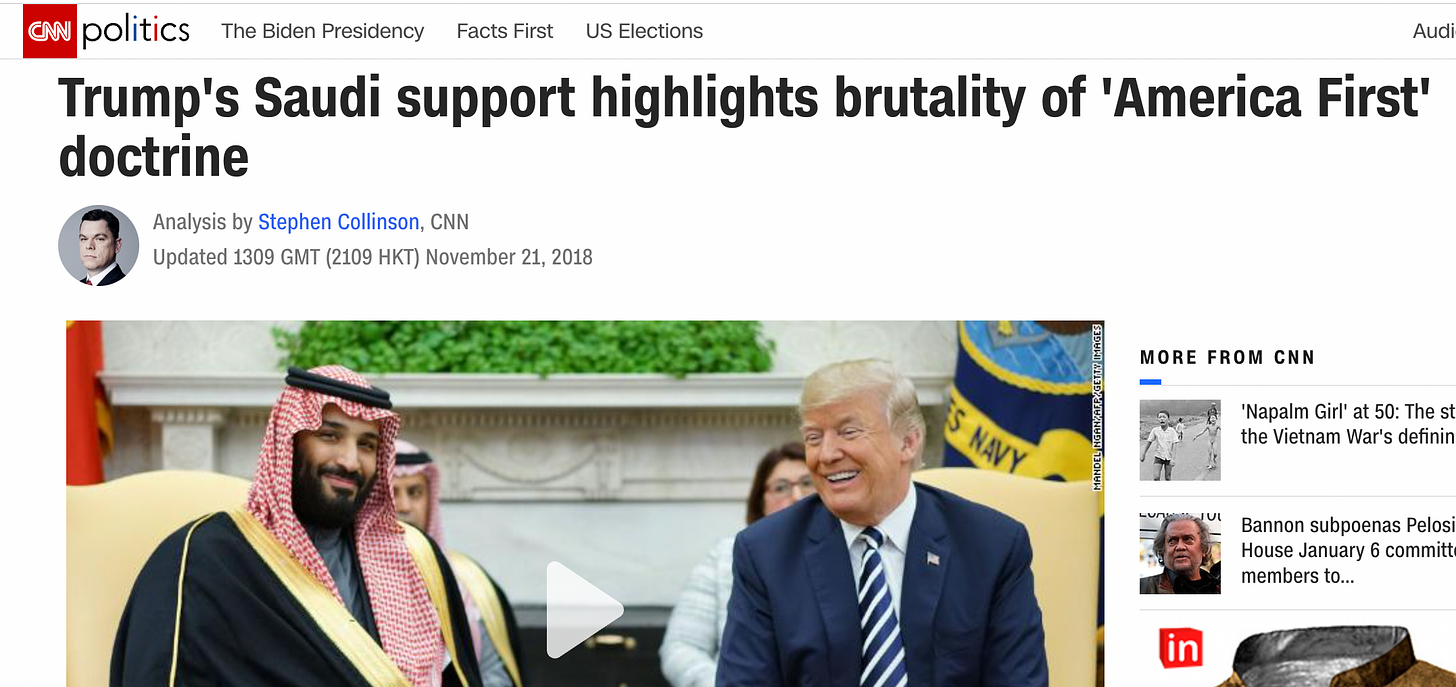
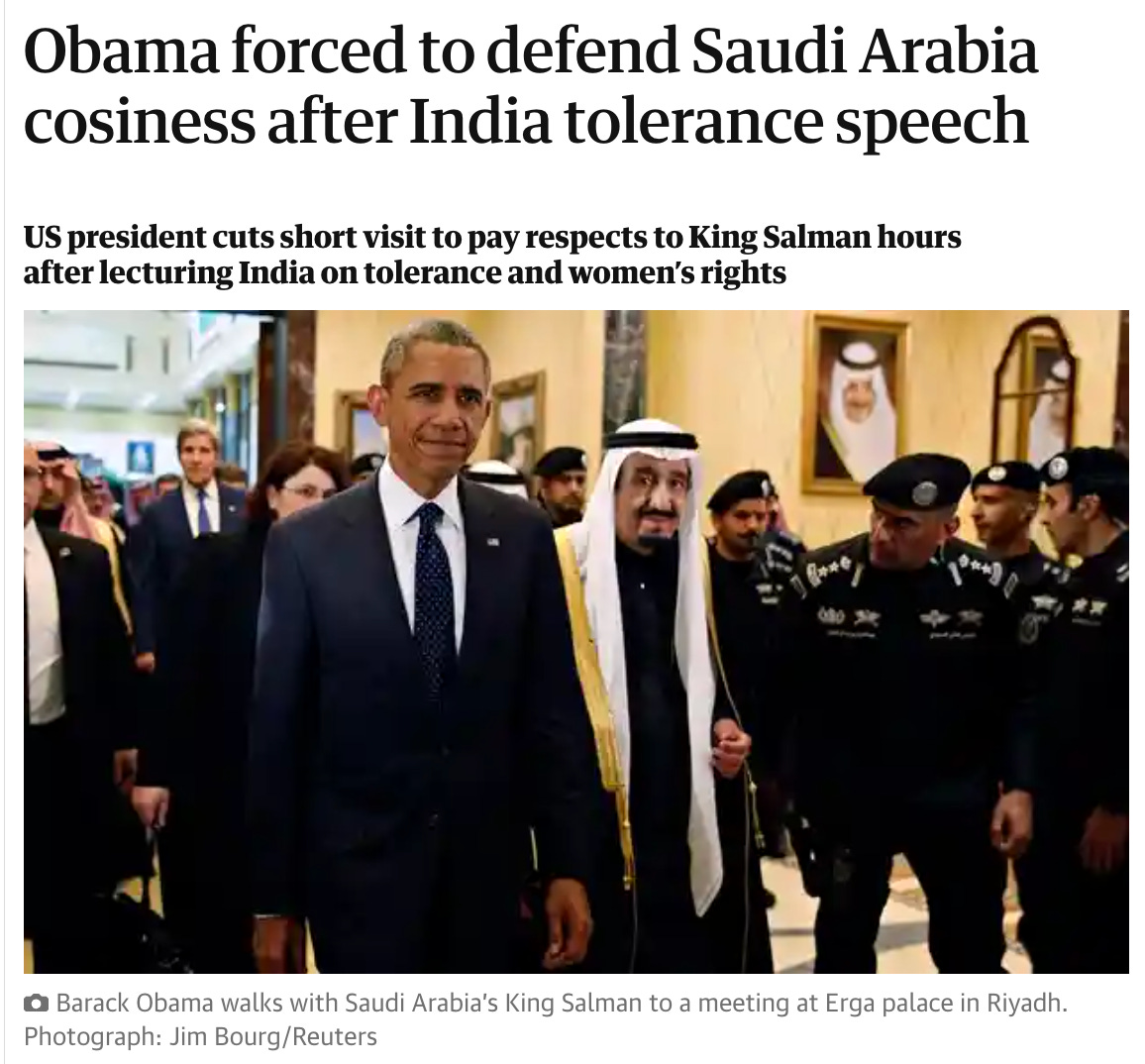
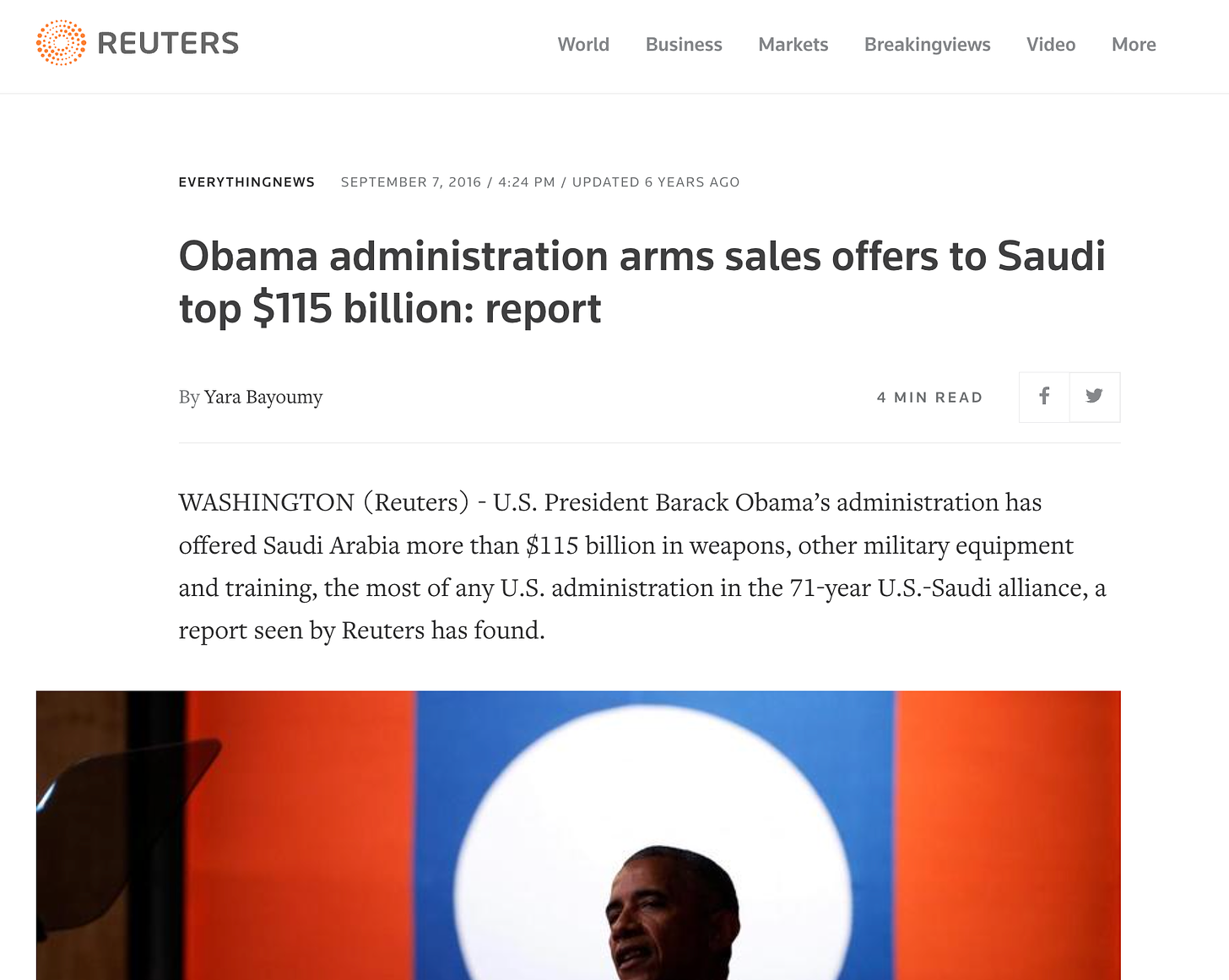
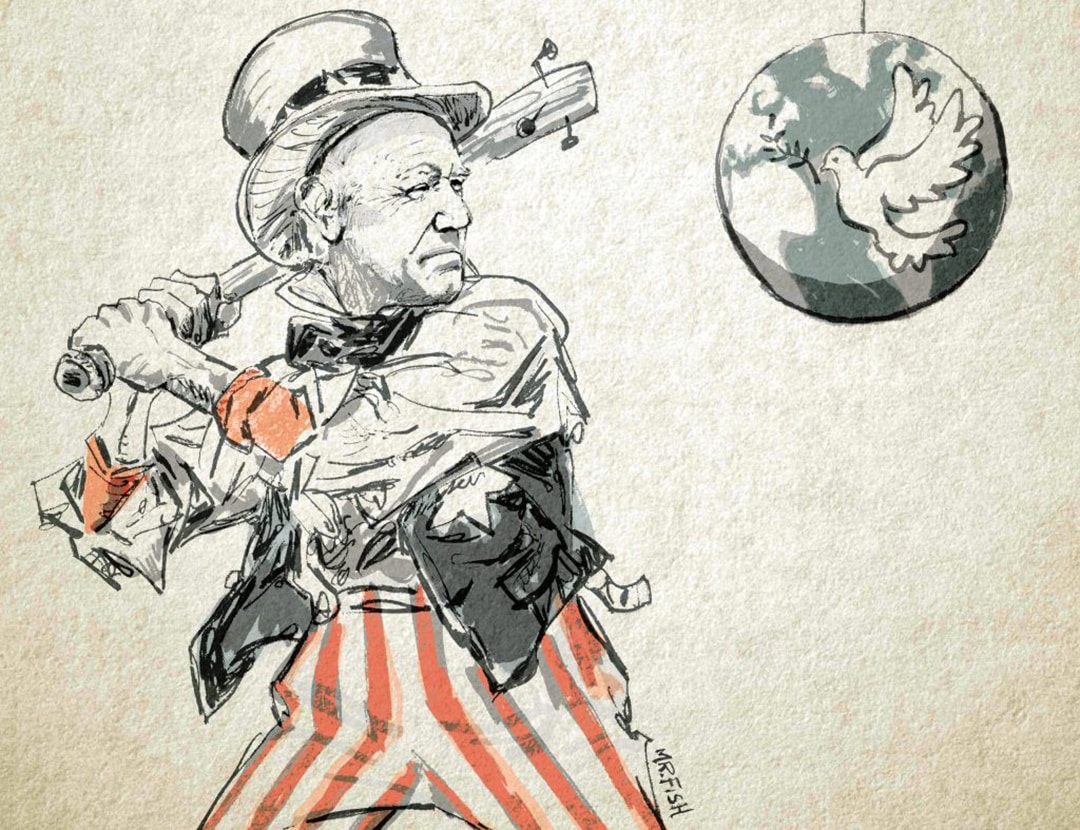


0 Comments